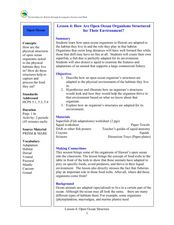Curated OER
Sea-ing More Clearly
Explore works of art with your class by engaging them in a variety of artistic activities including papier-mache sculpture, poetry, performance, and more. After viewing and discussing four paintings of the sea by Robert Harris, learners...
Curated OER
So Much Water, So Little to Drink
Students explore salt and fresh water. In this water lesson plan, students investigate the amount of Earth covered by water. Students compare the amounts of salt water to fresh water. Students create a visual representation to aid...
Curated OER
Energy Motion in the Ocean
Students explore the wave energy that is generated and transferred in the ocean. Through the use video and the Internet, students explore the aspects of a wave and how its energy affects the ecology of the seashore.
Curated OER
Ocean Currents and Sea Surface Temperature
Students use satellite data to explore sea surface temperature. They explore the relationship between the rotation of the Earth, the path of ocean current and air pressure centers. After studying maps of sea surface temperature and ocean...
Curated OER
How Are Open Ocean Organisms Structured for Their Environment?
Students explore biology by conducting an animal dissection. In this oceanography lesson, students identify the life cycle of a squid and other animals that are involved with commercial fishing. Students dissect a squid in class and...
Curated OER
Explore the Ocean
Students explore the oceans from their origin. In this oceans lesson, students read and discuss excerpts from the Book of Genesis regarding the creation of the ocean. Students then clean up a mock oil spill, measure the volume and area...
Curated OER
Ocean Grazers: Class Field Trip
Students explore biology by participating in a field trip. In this oceanography lesson, students define the survival characteristics of bottom dwelling creatures also known as ocean grazers. Students attend a class field trip to a beach...
Curated OER
Oceans and Coasts
Students explore the topic of marine pollution. They define key vocabulary words, list examples of marine pollution, complete a true/false handout, read an article, and participate in a class discussion.
Curated OER
Design a Reef!
Students explore coral reef ecosystems. In this ecosystems science instructional activity, students research coral reef ecosystems to determine the major functions the participating organisms must perform. Students construct...
Curated OER
Exploring Hurricanes
For this hurricane worksheet, students explore the behavior of hurricanes by reading an article about it. They complete 8 short answer questions that follow.
Alabama Department of Archives and History
La Mobile: A Case Study of Exploration and Settlement
The Le Moyne brothers, Jean-Baptiste and Pierre, were among the first explorers of the Gulf Coast. Class members read biographical information and journal entries about these men, study maps showing where the settlements they established...
American Chemical Society
Why Does Water Dissolve Salt?
Individuals explore solubility by modeling how water dissolves salts. They then view a video and compare how well water and alcohol dissolve salts, relating their comparisons to the structure of each molecule.
PhET
Wave on a String
The sound waves of thunder are made when lightning very quickly heats the air surrounding it, expanding faster than the speed of sound. Learners explore waves through their own movement of string or set waves to constantly oscillate....
Curated OER
Ocean Exploration: Dentists of the Sea!
Students watch videos about unusual fish behavior and write to marine scientists about the proper care of fish. In this fish lesson plan, students watch the videos on how to properly transfer fish to saltwater, and they do so in an...
Curated OER
Polar Bear Panic!
Students identify the three realms of the Arctic Ocean, and describe the relationships between these realms. They graphically analyze data on sea ice cover in the Arctic Ocean, and recognize a trend in these data.
Curated OER
Ocean Habitats:
Students investigate the creatures of intertidal zones. They explore the adaptations species make to survive .
NOAA
Oceans of Energy
Are the earth's oceans really just giant batteries, waiting for their energy to be harnessed? Middle school mechanical engineers will be shocked by the amazing amount of energy that forms around them after diving into part four of a...
NOAA
Wet Maps
How do oceanographers make maps under water? Junior explorers discover the technologies and processes involved in creating bathymetric maps in part three of a five-part series designed for fifth- and sixth-grade pupils. The lesson...
Polar Trec
Sea Ice Impact
The arctic seas contain currents that are both warm (with high salinity) and cold (relatively fresh water) that circulate throughout the year. Through discussion, a lab, and a web quest, participants explore the impacts of melting and...
NOAA
History's Thermometers
How is sea coral like a thermometer? Part three of a six-part series from NOAA describes how oceanographers can use coral growth to estimate water temperature over time. Life science pupils manipulate data to determine the age of corals...
NOAA
Animals of the Fire Ice
When the sun's rays can't reach the producers in a food web, where does all the energy come from? Extreme environments call for extreme food sources. Young scientists investigate creatures that appear to get their energy from methane...
NOAA
The Great, Glowing Orb What You Will Do: Make a Solar Heat Engine
How is solar energy able to move wind and water to control the climate? Scholars explore the concept of solar energy in the first of 10 activities in the Discover Your Changing World series. They follow instructions to build homemade...
Cornell University
Too Much of a Good Thing?
Continuing their study of beneficial insects, young entomologists discover where in the world some of these bugs are. By labeling, coloring, and using the scale on a map, pupils explore the territories and arrival of the Asian lady...
Curated OER
The Old Man and the Sea: Guided Imagery
What do you imagine when you think of the sea? Put on some ocean sounds, close your eyes, and listen to a guided meditation based on the imagery from The Old Man and the Sea by Ernest Hemingway. After class members listen to...
Other popular searches
- Ocean Exploration Tools
- Pacific Ocean Exploration
- Ocean Exploration Food Web
- Ocean Exploration Technology
- Bill Nye Ocean Exploration
- Ocean Exploration Time Lines
- Human Ocean Exploration
- Ocean Exploration Time Lime
- Bill Nye: Ocean Exploration
- Ocean Exploration Expeditions
- Ocean Exploration Timelime

























